Eager to legalise a route to anonymously funnel corporate money into the coffers of political parties, the Narendra Modi-led government dismissed the Election Commission of India’s strident opposition to electoral bonds, lied to the Indian Parliament and finally resorted to a hurried cover-up when its mis-statements were caught out.
Previously unpublished documents obtained by #KhabarLive reveal that three senior bureaucrats came up with six different convoluted explanations to protect then-Minister of State P. Radhakrishnan when he was caught lying about electoral bonds on the floor of the Parliament, Indian democracy’s most hallowed ground.
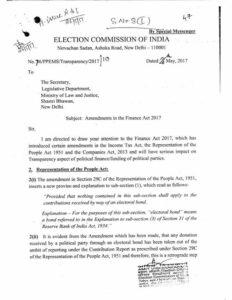 A confidential note, included in the documents, show senior bureaucrats knowingly sought to mislead Election Commission officials in an ultimately unsuccessful attempt to blunt the EC’s opposition to electoral bonds.
A confidential note, included in the documents, show senior bureaucrats knowingly sought to mislead Election Commission officials in an ultimately unsuccessful attempt to blunt the EC’s opposition to electoral bonds.
The Election Commission wasn’t the only one to see its suggestions summarily disregarded. The government made a show of asking opposition political parties for their views on the matter, even as the finance ministry continued to design the scheme without waiting to hear back from them or responding to their queries.
Taken as a whole, the documents reviewed by #KhabarLive expose the Modi government’s doublespeak on electoral bonds, a controversial financial instrument first unveiled in 2017 by then finance minister Arun Jaitley, that allows any corporation, trust, NGO or individual to donate unlimited amounts of money to India’s political parties.
95% of the money gathered by the first tranche of such bonds has gone to the ruling Bharatiya Janata Party (BJP), according to data compiled by the Association for Democratic Reforms.
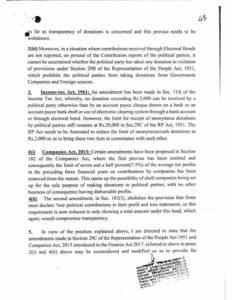 The Supreme Court is currently hearing a petition on the legality of such bonds. Now, documents obtained under the Right to Information Act by transparency activist Commodore Lokesh Batra (Retd.) suggest that the government’s utterances and assurances on the matter cannot be trusted, even when they are made before institutions like the Parliament.
The Supreme Court is currently hearing a petition on the legality of such bonds. Now, documents obtained under the Right to Information Act by transparency activist Commodore Lokesh Batra (Retd.) suggest that the government’s utterances and assurances on the matter cannot be trusted, even when they are made before institutions like the Parliament.
In the winter session of Parliament in 2018, Rajya Sabha Member Mohammad Nadimul Haque asked the government a simple question: Had the Election Commission of India raised concerns about electoral bonds?
The then minister of state for finance, P. Radhakrishnan, replied that the government had not received “any concerns from Election Commission on the issue of Electoral Bearer Bonds”.
This was false, as internal communications between the government — also exposed by Batra, the transparency activist — soon made clear. Haque filed a breach of privilege complaint against the minister for lying to Parliament, and the media picked up the story.
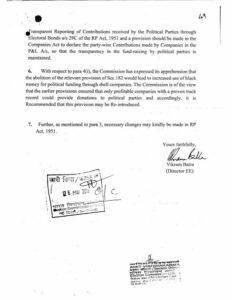 Now, #KhabarLive can reveal just how the government tried to walk back from Radhakrishnan’s false utterances in Parliament. Even the government’s response to the breach-of-privilege complaint was not wholly honest. Implicit in all this correspondence is one simple question: Why was the government so eager to muzzle the Election Commission’s opposition to Electoral Bonds?
Now, #KhabarLive can reveal just how the government tried to walk back from Radhakrishnan’s false utterances in Parliament. Even the government’s response to the breach-of-privilege complaint was not wholly honest. Implicit in all this correspondence is one simple question: Why was the government so eager to muzzle the Election Commission’s opposition to Electoral Bonds?
The finance ministry told #KhabarLive it would not be able to provide detailed responses to specific questions as it was busy preparing next year’s Union Budget, but said that all the decisions were taken “in good faith”.
″All the issues raised in the email are on the policy decisions taken by the then respective competent authorities. In this context, it may be mentioned that in the Government organisations all the decisions are taken in good faith and in the larger public interest. Interpretation of decisions taken may have different perspectives, hence an appropriate explanation may only be given, after taking into consideration all he aspects factored into the decisions making process,” the finance ministry said in an email.
Covering up EC objections
In May 2017, the Election Commission of India wrote to the Union Ministry of Law and Justice, warning that electoral bonds would help political parties hide illegal donations from foreign sources. Dubious donors could now set up shell companies to funnel black money to politicians and mask the true source of the money.
The commission wanted electoral bonds and other legal changes made by the government to reduce transparency in funding of political parties to be rolled back.
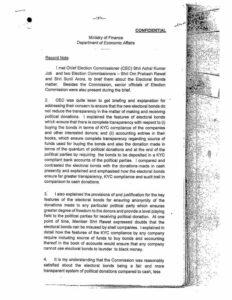 On July 3, 2017, the Law Ministry forwarded the Election Commission’s concerns to the Department of Economic Affairs of the finance ministry; but the finance ministry simply pretended it had never heard from the Commission.
On July 3, 2017, the Law Ministry forwarded the Election Commission’s concerns to the Department of Economic Affairs of the finance ministry; but the finance ministry simply pretended it had never heard from the Commission.
Rather than responding to the Commission’s fundamental concerns in writing to the law ministry, then finance minister Arun Jaitley ordered a meeting be called with both RBI and Election Commission to “finalise the structure of the Electoral Bonds”.
In the face of such strident opposition from the EC, the government chose to steamroll ahead, rather than revisit its insistence on a secrecy-laden funding route for political parties.
The meeting was held on July 19, 2017, and attended by two officials from the Election Commission. Economic affairs secretary S.C. Garg later recorded in his files that he briefed the two and “laid emphasis that the scheme does provide level-playing field and encourage transparent funding of political parties”.
Records from the law and justice ministry show the Election Commission was still not impressed.
A note dated September 22, 2017 by Garg, addressed to the finance minister and marked ‘confidential’, points to another meeting that he held on July 28, 2017, directly with the then Chief Election Commissioner Achal Kumar and two Election Commissioners Om Prakash Rawat and Sunil Arora.
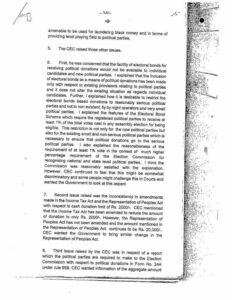 In his note, Garg wrote that he had told the Commissioners that companies would make accounting entries in their books when buying electoral bonds, which would ensure “complete transparency” regarding the “source of funds used for buying electoral bonds” as well as the “quantum of political donations”.
In his note, Garg wrote that he had told the Commissioners that companies would make accounting entries in their books when buying electoral bonds, which would ensure “complete transparency” regarding the “source of funds used for buying electoral bonds” as well as the “quantum of political donations”.
This was false: Companies are not required to detail to whom they donated electoral bonds in their profit-and-loss statements and balance sheets. Only the aggregated profit-and-loss accounts and balance sheets, which form part of the annual submissions to the government, are available for public scrutiny.
Garg said he explained to the Commissioners the “provisions and justification for key features of the electoral bonds for ensuring anonymity of the donations made, which ensures greater degree of freedom to the donors and provide a level playing field to the political parties.”
Garg’s confidential note points to several concerns raised yet again by the Election Commissioners in person in this meeting, including that the bonds could allow shell companies to launder money to political parties. It also points out how the Commission still wanted the government to change some provisions to provide more transparency.
Yet, he records, “It is my understanding that the Commission was reasonably satisfied about the electoral bonds being a fair and more transparent system of political donations.”
This was, once again, a false statement.
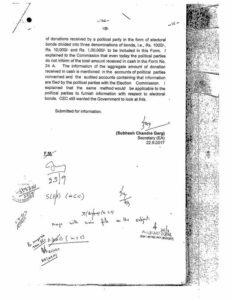 Even as late as October 2018, the law and justice ministry records show, the Election Commission continued to insist upon the rollback of the bonds and other anti-transparency provisions the government had introduced. The ministry’s records also show the finance ministry continued to ignore reminders to respond to the Commission’s formally submitted views.
Even as late as October 2018, the law and justice ministry records show, the Election Commission continued to insist upon the rollback of the bonds and other anti-transparency provisions the government had introduced. The ministry’s records also show the finance ministry continued to ignore reminders to respond to the Commission’s formally submitted views.
These records of face-to-face meetings between officials of the finance ministry and the Election Commission, and all the correspondence detailed above, makes clear that the finance ministry knew of the Election Commission’s objections to the electoral bond scheme.
Which makes it all the more puzzling why minister of state for finance Radhakrishnan, responding to Haque’s question in the winter session of 2018, confidently told Parliament that the government had not received “any concerns from Election Commission on the issue of Electoral Bearer Bonds”.
Transparency activist Batra’s revelations that the Election Commission had indeed written to the ministry of law and justice with its objections were published in the press. Based on these, Haque sent a notice for breach of privilege, which was forwarded by the Rajya Sabha secretariat for the finance ministry’s response on December 28, 2018.
Radhakrishnan had been caught misleading Parliament, and the finance ministry tied itself in knots to defend the indefensible.
Several options, all of them lies, each more convoluted than the other, were proposed as a way to hide the facts.
One official, deputy director Vijay Kumar, who had been handling the electoral bond scheme all through, advised on January 1, 2019, that while the economic affairs secretary Garg had even met the Election Commissioner officials personally on the issue, they could still say that Election Commission had not directly apprised them of their concerns in writing. So, he advised his seniors that the minister of state for finance, Radhakrishnan, had not lied to the Parliament.
He first admitted Radhakrishnan had given a wrong statement to Parliament. On January 2, 2019, he penned down his views, “There is a flow in the answer given. It has been stated that the government had not received any concerns from Election Commission. If it was noted that ministry of finance did not receive any concern it could have been correct in light of the facts brought out above.”
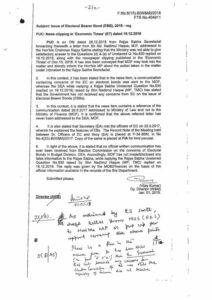 Then he suggested two options:
Then he suggested two options:
“Either clarify to the minister that the government in answer for parts (d) and (e) was meant to be Ministry of Finance or make a clarificatory statement in the House about correct facts of the case. Please examine and let us discuss with FM,” he penned down.
Based on the inputs from his boss, Garg’s subordinate, joint secretary of the budget division, came up with three innovative excuses to claim that the minister of state had not told a lie.
Two of these were based on bureaucratic jargon and the third on obfuscation of the truth. He said, “There exists no official communication between the Election Commission of India and the Ministry of Finance informing the Ministry of Finance of any concerns on the issue of Electoral Bonds. The newspaper reports refer to the letter of ECI dated May 26, 2017. This letter was not received in the ministry of finance. Therefore ministry of finance never had any opportunity to examine the letter referred to in the newspapers.”
This was a lie. As other media reports have revealed, the Election Commission’s letter had been received by the finance ministry, including by the division that was drumming up these lies and the department of revenue, from where the idea of electoral bonds had originated on government records. To top it all, as #KhabarLive has revealed for the first time above, the department of economic affairs secretary, Garg, had personally met the Election Commissioners on July 28, 2018 to discuss their apprehensions over electoral bonds.
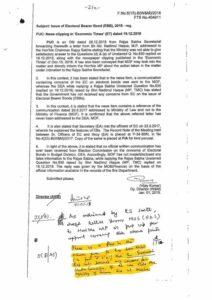 Yet, Garg agreed with the argument that the government should brazen it out in the Parliament. So did finance minister Jaitley.
Yet, Garg agreed with the argument that the government should brazen it out in the Parliament. So did finance minister Jaitley.
Consequently, on January 12, 2019, the minister of state for finance, Radhakrishnan replied to Haque, “No formal communication has been received from Election Commission of India on their concerns about electoral bonds scheme in the ministry of finance. Therefore in the answer, Government was intended to mean the ministry of finance. I may assure you there is no attempt to mislead the august House of Parliament and the scheme of electoral bonds is transparent enough to achieve the intended objectives.”
Batra, the transparency activist, exposed this cover-up as well. He found that the finance ministry had also received the Election Commission’s letter of objections through the law and justice ministry on July 3, 2017. This particular letter from Election Commission was circulated to all departments and divisions that dealt with electoral bonds.
One of them—the Financial Sector Reforms and Legislation division under the Department of Economic Affairs, which was supervising the implementation of the bonds—even agreed with the Election Commission’s views. But the finance ministry just would not respond in writing to the objections. To do so would have meant acknowledging the Commission had conceptual and fundamental problems with the electoral bonds and not just procedural concerns.
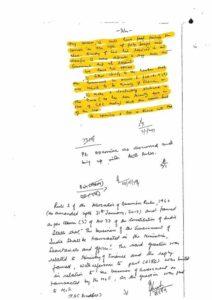 The Election Commissioners remained consistently opposed to the bonds even after meeting in person with economic affairs secretary, documents with #KhabarLive show.
The Election Commissioners remained consistently opposed to the bonds even after meeting in person with economic affairs secretary, documents with #KhabarLive show.
The Commission’s continued objections became public knowledge when, in March 2019, it reiterated its opposition to Electoral Bonds in an affidavit submitted to the Supreme Court. But by now, electoral bonds worth more than Rs 1,400 crore had already been purchased by corporations and donated to political parties.
In August 2019, the incumbent finance minister Nirmala Sitaraman sought to lay the controversy to rest. She tabled a ‘corrected reply’ to Haque’s question in the Parliament.
The corrected reply, which now forms part of the Parliamentary record, acknowledges that the Election Commission had raised serious concerns about Electoral Bonds. This time around, the finance ministry did not use the technical interpretation of bureaucratic rules to deny the facts.
Yet, rather deftly, Sitharaman also avoided answering the other key question Haque had originally asked: What had the government done to address the concerns of Election Commission?
To this question, the minister merely furnished a cut-paste answer detailing the features of the Electoral Bonds scheme that the government has been running for nearly two years.
Who’s listening?
It was not just the Election Commission or the RBI which the government pretended to consult during the setting up of the electoral bonds scheme even as it steamrolled ahead with its plans. It did the same to political parties as well, show documents.
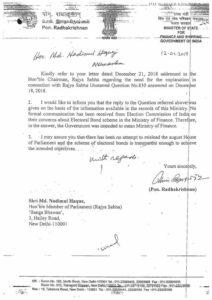 On May 2, 2017, Finance Minister Jaitley wrote to India’s opposition parties, asking for suggestions on how to improve and implement the electoral bond scheme.
On May 2, 2017, Finance Minister Jaitley wrote to India’s opposition parties, asking for suggestions on how to improve and implement the electoral bond scheme.
Several wrote back.
“I note that the government is concerned with the issue of transparency in electoral funding of political parties,” the Congress’s then treasurer Motilal Vohra wrote. “Transparency implies that the electorate must know 1) Who is the donor 2) Which is the donee political party and 3) What is the amount donated.”
In the absence of any specific scheme, Vora said the finance minister’s speech and public comments suggested the “donor’s names will be known only to the bank issuing the bond and the donee’s name will be known only to the income tax department. In effect only the government will know the names of the donors and the donee and the people will not know.”
He concluded, “We will be able to comment further only after we have studied the scheme promised to be made by the government.”
Mayawati, national president of the Bahujan Samaj Party, also responded, saying, “It would be appreciated and helpful if you could furnish some draft proposal of the scheme as is being or has been conceived by the government.”
Sudhakar Reddy, then general secretary of CPI, gave an elaborate reason for the party not believing the claim about the scheme bringing about transparency. Instead, he said the amendments made to different laws retrospectively provided secrecy to corporate donors to political parties.
“We are opposing the secretive political bonds scheme and amendments to the corporate act on political funding. We also demand a roll back of amendment to Companies Act and put a reasonable cap on the corporates funding political parties,” Reddy said.
At least one political ally of the BJP, Shiromani Akali Dal (SAD), responded to congratulate the government for taking a ‘landmark’ step towards transparency in political funding. But Daljit Singh Cheema, SAD secretary, went on to say that “it would be more ethical if only profit-making companies are allowed to donate some percentage of their profits to any political party through electoral bonds.”
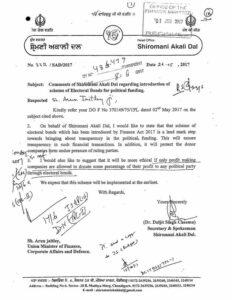 The SAD’s suggestions ran completely contrary to what the BJP had just done in the budget session—it removed the provision that capped corporate donations at 7.5% of a company’s profits averaged over three years.
The SAD’s suggestions ran completely contrary to what the BJP had just done in the budget session—it removed the provision that capped corporate donations at 7.5% of a company’s profits averaged over three years.
Having heard back from the political parties, some outlining serious misgivings about electoral bonds and some asking for more information, the finance ministry mandarins worked feverishly to draft out a scheme that served their political masters. Once done, they asked the then finance minister if the prepared draft structure and scheme of the electoral bonds should be shared with all political parties. Jaitley stayed silent on the question, indicating the details of the scheme should not be shared with other political parties.
The supposed dialogue with the opposition was just another perfunctory exercise for the government to claim that the electoral bond scheme had been formulated after due consultations, just as it had tried to do with the RBI and with the Election Commission.
(This story is part of #MoneyPolitics, an exclusive #KhabarLive investigation into how the Modi government brought untraceable funds into Indian politics.)

